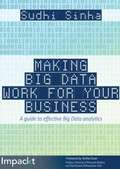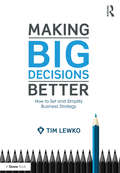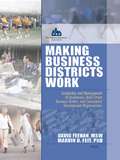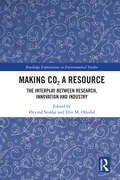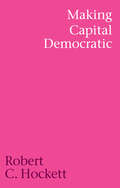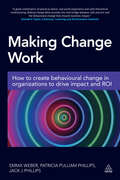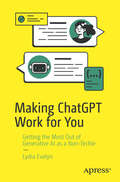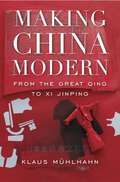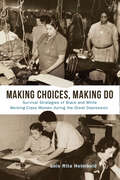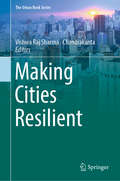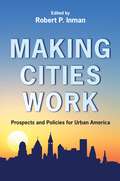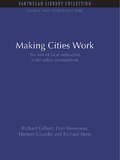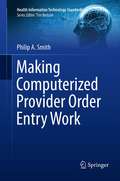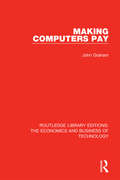- Table View
- List View
Making Better Decisions: Leveraging Your Organization's Data and Information
by Thomas C. RedmanThe surest way to make and execute better decisions is to fully leverage available data and information. This chapter shows how good decision makers measure outcomes and then apply tools of continuous improvement both to processes and individual decisions, and manage the uncertainty that is inherent in decision making.
Making Big Data Work for Your Business
by Sudhi SinhaIf your are interested in the power of Big Data to drive improvement in your business, then this book will help you build and initiate a project for positive change.
Making Big Decisions Better: How to Set and Simplify Business Strategy
by Tim LewkoMaking Big Decisions Better is leading a global movement to equip present and next generation leaders with proven strategy tools that enable agile thinking that ignites stronger, more predictable, direct paths to profit. No more academic theories. These are real tools and a system that enables improved strategic thinking and leadership. This book bridges an unspoken gap in strategy thinking that until now, only provided leaders with just SWOT and Porter’s 5 Forces as the language of strategy. By using the decision making tools in Making Big Decisions Better, you’ll finally remove the mystique of those you manage up to, and lead those that report to you. You will standout and have a transportable set of tools for any role or industry. There’s never been a better time to break away from the outdated, mainstream strategy planning process that misused scarce resources, burned out its leaders and never delivered the results. It’s your turn to learn and lead!
Making Bourbon: A Geographical History of Distilling in Nineteenth-Century Kentucky
by Karl Raitz“Raitz examines the rich story of distilling in its Kentucky heartland and traces its maturation from a local craft to an enduring industry.” —William Wyckoff, author of How to Read the American WestWhile other industries chase after the new and improved, bourbon makers celebrate traditions that hearken back to an authentic frontier craft. Distillers enshrine local history in their branding and time-tested recipes, and rightfully so. Kentucky’s unique geography shaped the whiskeys its settlers produced, and for more than two centuries, distilling bourbon fundamentally altered every aspect of Kentucky’s landscape and culture.Making Bourbon: A Geographical History of Distilling in Nineteenth-Century Kentucky illuminates how the specific geography, culture, and ecology of the Bluegrass converged and gave birth to Kentucky’s favorite barrel-aged whiskey. Expanding on his fall 2019 release Bourbon’s Backroads, Karl Raitz delivers a more nuanced discussion of bourbon’s evolution by contrasting the fates of two distilleries in Scott and Nelson Counties. In the nineteenth century, distilling changed from an artisanal craft practiced by farmers and millers to a large-scale mechanized industry. The resulting infrastructure—farms, mills, turnpikes, railroads, steamboats, lumberyards, and cooperage shops—left its permanent mark on the land and traditions of the commonwealth. Today, multinational brands emphasize and even construct this local heritage. This unique interdisciplinary study uncovers the complex history poured into every glass of bourbon.“A gem. The depth of Raitz’s research and the breadth of his analysis have produced a masterful telling of the shift from craft to industrial distilling. And in telling us the story of bourbon, Raitz also makes a terrific contribution to our understanding of America's nineteenth-century economy.” —David E. Hamilton, author of From New Day to New Deal
Making British Indian Fictions
by Ashok MalhotraThis book examines fictional representations of India in novels, plays and poetry produced between the years 1772 to 1823 as historical source material. It uses literary texts as case studies to investigate how Britons residing both in the metropole and in India justified, confronted and imagined the colonial encounter during this period. The study will situate the texts in relation to the shifting colonial context and to the changing attitudes towards India within Britain in general and on the part of Britons who had experience of living in India, such as East India Company men or their wives and daughters, in particular. Moreover, it will analyse how this literature responded to the increasing influence of the subcontinent on metropolitan culture. This book, then, approaches fictional texts as case studies that illuminate trends taking place within Britain such as the growing consumption of Indian-style imported goods and the commoditisation of an Indian aesthetic within British visual culture. Whilst the book will utilise fictional portrayals to comment upon shifts in the relationship between coloniser and colonised and to discuss the cross-cultural influences between the metropole and the colonial periphery, it also outlines how literary production and print capitalism played a part in shaping depictions of the subcontinent and stereotypes of the colonial 'other'. The study will also examine how representations of the subcontinent in British art and scholarship were influenced by metropolitan literary and popular culture. At the same time it will look at how representations by metropolitan authors influenced early-nineteenth century depictions by British authors who resided in India.
Making Business Districts Work: Leadership and Management of Downtown, Main Street, Business District, and Community Development Org
by Marvin D Feit David FeehanUnprecedented, broad coverage of downtown and community development topics from a practitioner&’s viewpoint!Making Business Districts Work: Leadership and Management of Downtown, Main Street, Business District, and Community Development Organizations is the essential desk reference for downtown and community business district profe
Making Buying Decisions: Using the Computer as a Tool (2nd edition)
by Richard ClodfelterDesigned for use in a buying course with a heavy math emphasis, activities involve the student solving merchandising problems by using computerized spreadsheets. This manual is designed to accompany the text Retail Buying, 2nd edition, also by Richard Clodfelter.
Making CO2 a Resource: The Interplay Between Research, Innovation and Industry (Routledge Explorations in Environmental Studies)
by Elin M. Oftedal Øyvind StokkeThis interdisciplinary book explores how CO2 can become a resource instead of a waste and, as such, be a tool to meet one of the grandest challenges humanity is facing: climate change.Drawing on a Norwegian narrative that has significance for a global audience, Øyvind Stokke and Elin Oftedal introduce in-depth, multi-perspective analyses of a sustainable innovation research experiment in industrial carbon capture and utilisation technologies. Building on extensive literature within marine sciences, sustainability research, and environmental philosophy and ethics, this book documents how a misplaced resource like CO2 can become valuable within a circular economy in its own right, while at the same time meeting the challenge of food security in a world where food production is increasingly under pressure. The book is diverse in scope and includes chapters on how to reduce the environmental footprint of aquaculture by replacing wild fish and soy from the Amazon, how to optimise the monitoring of aquatic environments via smart technologies, and how to replace materials otherwise sourced from natural environments. The authors also analyse the pivotal role of the university in driving innovation and entrepreneurship, the pitfalls of different carbon technologies, and explore how the link between petroleum dependence and CO2 emissions has been addressed in Norway specifically.Making CO2 a Resource will be of great interest to students and scholars of climate change, environmental ethics, environmental philosophy, sustainable business and innovation, and sustainable development more broadly.
Making Capital Democratic: A Reconstruction of State, Credit, and Finance
by Robert C. HockettThe “software” that structures our financial systems and, through them, the broader economy, is made up of certain basic concepts that guide how we think. These concepts include money, finance, investment, credit, and – above all – capital. This conceptual software manifests itself in our current “operating system” of institutions and practices. But our concepts and the system itself are radically out of date as representations of monetary, financial, productive and distributive reality. Robert Hockett shows that this mismatch has serious consequences and argues that it’s time for a complete overhaul of our economic understanding.The underlying conceptual problem, Hockett contends, is that we miss the extent to which our financial systems are deeply and ineradicably public. Money is an inherent emanation of our basic social contract; capital in turn emerges as almost entirely publicly generated. Our systems of finance and investment must therefore be publicly and democratically determined. Leaving them in the hands of private powers means resigning ourselves to current health and income inequalities, ever-more-frequent financial crises, and economic stagnation and decline – to say nothing of social and political deterioration across the developed world.Lucid and passionately argued, Making Capital Democratic is a seamless blend of philosophy and economics that calls for profound intellectual and institutional changes that would befit a democracy that is democratic in more than just name.
Making Career Stories
by Mark ScillioThis book is about how people construct career stories: the stories we use to make sense of our work life. Mark Scillio explores the idea of security in the current turbulent employment climate, investigating employment experiences in developed, wealthy countries like Australia, the United States, and the United Kingdom--where careers have become fragmented, complex, and uncertain. Using Anthony Giddens' notion of ontological security, Scillio develops a concept of career security that goes beyond economic and financial concerns and encompasses the personal and social meaning of work. The ramifications of succeeding (or failing) to forge a good career narrative are explored through a series of detailed case studies.
Making Change Work: How to Create Behavioural Change in Organizations to Drive Impact and ROI
by Patricia Pulliam Phillips Emma Weber Dr Jack PhillipsUnderpinned by decades of research and application, Making Change Work shows that the lynchpin that connects change initiatives and their ultimate success is behavioural change. The book brings together the ROI Institute's established methodology for aligning projects and programmes to business needs and for evaluating impact and ROI with the Turning Learning Into Action methodology developed by Emma Weber to support learning transfer. It offers a step-by-step process that partners with any business initiative requiring behavioural change, providing the critical link bridging the knowledge and application. At the heart of the methodology is a framework for reflective conversation, ensuring accountability and aligning people to the desired outcomes. Cutting through complex change theory, Making Change Work is a 'how to' guide, providing an end-to-end approach to solve the problem that businesses have grappled with for so long from change projects that don't deliver business impact. It includes real life case studies from organizations such as BMW and the University of NSW Department of Innovation on how organizations are using the framework to create successful outcomes that are not just demonstrated but that are delivered and measurable. It is ideal for any professional who is embarking on any organizational initiative requiring change and evaluation of the subsequent ROI, whether it is a learning initiative, quality initiative or change initiative.
Making Changes in STEM Education: The Change Maker's Toolkit
by Julia M. WilliamsMany science, engineering, technology, and math (STEM) faculty wish to make an academic change at the course, department, college, or university level, but they lack the specific tools and training that can help them achieve the changes they desire. Making Changes in STEM Education: The Change Maker’s Toolkit is a practical guide based on academic change research and designed to equip STEM faculty and administrators with the skills necessary to accomplish their academic change goals. Each tool is categorized by a dominant theme in change work, such as opportunities for change, strategic vision, communication, teamwork, stakeholders, and partnerships, and is presented in context by the author, herself a change leader in STEM. In addition, the author provides interviews with STEM faculty and leaders who are engaged in their own change projects, offering additional insight into how the tools can be applied to a variety of educational contexts. The book is ideal for STEM faculty who are working to change their courses, curricula, departments, and campuses and STEM administrators who lead such change work to support their faculties, as well as graduate students in STEM who plan to enter an academic position upon graduation and expect to work on academic change projects.
Making ChatGPT Work for You: Getting the Most Out of Generative AI as a Non-Techie
by Lydia EvelynGain a clear and practical understanding of ChatGPT, the cutting-edge language model that is revolutionizing how we create content, analyse data, and communicate. This book will be your essential companion for navigating the rapidly-evolving world of generative AI. You&’ll explore an army of diverse features boasted by ChatGPT, including web searching, analysing images, PDFs and other file types, image creation with ChatGPT&’s DALL-E, and video generation with ChatGPT&’s Sora. Highlighted by over 100 prompts, this book boasts step-by-step guides on how to use ChatGPT for a variety of tasks such as thesis writing, creating a sales report, and even creating a budget planner from actual receipts. Each chapter has a series of practical examples you can follow along with so you can try out the explanations for yourself. You&’ll also learn how to use ChatGPT as a personal assistant, yet another tool to streamline and simplify productivity. With these powerful capabilities in hand, Making ChatGPT Work for You is your prompt cookbook! What You Will Learn Generate unique and engaging text for social media posts, blogs articles, and creative writing. Upload files and images to ChatGPT to analyse data, explain text, and analyse photos. Leverage ChatGPT to interpret and analyse datasets, provide insights and solutions, create budget plans, sales reports, and more. Use ChatGPT as a versatile educational tool for learning new skills. Work with ChatGPT&’s DALL-E and Sora features to generate images and short videos for creating content for landing pages and YouTube videos. Who This Book Is For Professionals, students, educators, and content creators curious about AI and looking to use ChatGPT for practical applications.
Making Chicago Price Theory: Friedman-Stigler Correspondence 1945-1957 (Routledge Studies in the History of Economics)
by Daniel J. Hammond Claire H. HammondMilton Friedman and George J. Stigler shaped economics as we know it today – their Chicago School laid the groundwork for much of the neoclassical tradition in economic analysis. This book brings together a collection of letters from these two Noble laureates from the post-war years, containing new information about their personal and professional relationships, and also illuminating the development of ideas which are now fundamental to economic theory. The book, expertly edited by Dan and Claire Hammond, contains an introductory chapter, chronologies for Friedman and Stigler, and transcripts of sixty eight letters written from 1945 to 1957 along with enclosures.
Making China Beautiful: Shiseido and the China Market
by Geoffrey G. Jones Masako Egawa Akiko KannoDescribes the multinational growth of Shiseido, the world's fourth-largest cosmetics company, with a focus on its strategy in China since 1981. Explores the challenges facing firms in the globalization of a culturally specific industry such as cosmetics. The Japanese company displayed an early interest in international expansion, but its early investments were lost during World War II. Thereafter, it sought to build businesses in Europe and North America, but was challenged by market conditions quite different from those in Japan. Even within its home market, deregulation and the entry of foreign firms during the 1990s led to a significant loss in market share. Shiseido entered China in 1981 and built Aupres, a large cosmetics brand specifically aimed at Chinese women. Further growth followed, and in 2003, plans were announced to build a large network of voluntary chain stores. Highlights managerial challenges of growing the China business further in the face of increasing competition and provides a framework for discussing the challenges of prioritizing the allocation of resources in a global business.
Making China Modern: From the Great Qing to Xi Jinping
by Klaus MühlhahnKlaus Mühlhahn situates modern China in the nation’s long, dynamic tradition of overcoming adversity and weakness through creative adaptation—a legacy of crisis and recovery that is apparent today in China’s triumphs but also in its most worrisome trends. Mühlhahn’s panoramic survey rewrites the history of modern China for a new generation.
Making Choices, Making Do: Survival Strategies of Black and White Working-Class Women during the Great Depression
by Lois Rita HelmboldMaking Choices, Making Do is a comparative study of Black and white working-class women’s survival strategies during the Great Depression. Based on analysis of employment histories and Depression-era interviews of 1,340 women in Chicago, Cleveland, Philadelphia, and South Bend and letters from domestic workers, Lois Helmbold discovered that Black women lost work more rapidly and in greater proportions. The benefits that white women accrued because of structural racism meant they avoided the utter destitution that more commonly swallowed their Black peers. When let go from a job, a white woman was more successful in securing a less desirable job, while Black women, especially older Black women, were pushed out of the labor force entirely. Helmbold found that working-class women practiced the same strategies, but institutionalized racism in employment, housing, and relief assured that Black women worked harder, but fared worse. Making Choices, Making Do strives to fill the gap in the labor history of women, both Black and white. The book will challenge the limits of segregated histories and encourage more comparative analyses.
Making Choices: Readings in Economics
by Ray NotgrassMaking Choices is a collection of historic and modern documents, essays, and speeches that is designed to be used with the Notgrass Exploring Economics, 2nd Edition curriculum. It includes: excerpts from Adam Smith's The Wealth of Nations, John Davenport's Christianity, the Market, and Beyond, Free to Choose: A Conversation with Milton Friedman, Solving the Problem of Poverty by Steve Mariotti, Speech on the economic bailout proposal by George W. Bush, and more.
Making Cities Resilient (The Urban Book Series)
by Chandrakanta Vishwa Raj SharmaAs the world has transformed, so have cities. Today, cities are home to 54 percent of the world’s population, and by the middle of this century that figure will likely rise to 66 percent. According to the United Nations (UN) Habitat I (1972), Habitat II (1996) and Habitat III (2016) summits, cities are facing many serious challenges, including growing inequality, security concerns and the worsening impacts of climate change. Uncontrolled urbanization has led to many problems (haphazard growth of areas, emergence of slums, inadequate water and power supply, poor sanitation, shortage of transport and other civic amenities, shrinking green spaces, pollution, crime, and urban disaster risks such as fire, flood, road and industrial accidents, etc.). Worldwide, communities at the international, national and local level are continuously working to improve human habitats. In order to make our planet more sustainable, the UN has moved from the Millennium Development Goals (MDG) to the Sustainable Development Goals (SDG). Among the latter, the aim of SDG 11 is to “…make cities and human settlements inclusive, safe, resilient and sustainable.” In light of these challenges, various terms have emerged to help understand urban issues. Visualizing the problem, the United Nations program “Making Cities Resilient” is focused on mitigating the disaster risk in urban areas. This book analyzes terms such as: sustainable, resilient, livable, inclusive, smart and world class city, which have emerged in the process of combating urban challenges in today’s world. The book addresses emerging concepts for cities, challenges and potentials, urban environments, health and planning/policies. Covering 14 large cities in India, as well as case studies from Japan, Singapore, Thailand, Malaysia, Poland and Sweden, it provides a regional dimension to and micro-level perspective on urban issues.
Making Cities Work: Prospects and Policies for Urban America
by Robert P. InmanMaking Cities Work brings together leading writers and scholars on urban America to offer critical perspectives on how to sustain prosperous, livable cities in today's fast-evolving economy. Successful cities provide jobs, quality schools, safe and clean neighborhoods, effective transportation, and welcoming spaces for all residents. But cities must be managed well if they are to remain attractive places to work, relax, and raise a family; otherwise residents, firms, and workers will leave and the social and economic advantages of city living will be lost. Drawing on cutting-edge research in the social sciences, the contributors explore optimal ways to manage the modern city and propose solutions to today's most pressing urban problems. Topics include the urban economy, transportation, housing and open space, immigration, race, the impacts of poverty on children, education, crime, and financing and managing services. The contributors show how to make cities work for diverse urban constituencies, and why we still need cities despite the many challenges they pose. Making Cities Work brings the latest findings in urban economics to policymakers, researchers, and students, as well as anyone interested in urban affairs. In addition to the editor, the contributors are David Card, Philip J. Cook, Janet Currie, Edward L. Glaeser, Joseph Gyourko, Richard J. Murnane, Witold Rybczynski, Kenneth A. Small, and Jacob L. Vigdor.
Making Cities Work: Role of Local Authorities in the Urban Environment (Energy and Infrastructure Set)
by Richard Gilbert Herbert Girardet Don Stevenson Richard StrenFor too long, cities have been thought of as environmental blackspots, with high levels of air and soil pollution, overcrowding, poor sanitation and growing waste disposal problems. This book takes a more positive attitude: cities can be made to work sustainably. Their high population density can work in the environment's favour if they can achieve efficient use of resources such as energy and water supplies, and improve transport and infrastructure. The best cities today are clean, resource efficient, green and pleasant, and not only act as cultural and entertainment centres, but also harbour great varieties of wildlife. Making Cities Work looks at the vital role which local authorities can - and must - play in safeguarding and developing our towns and cities. Their role is crucial, and the aim of the book is to make governments, international bodies and local authority associations aware of how potential environmental and social problems can be overcome, and what can be achieved. This book is being written by urban development experts, based on material supplied by the world's leading city associations. It is being edited by one of the world's most highly regarded cultural ecologists, and has been commissioned by UNHCS for the Habitat II conference. Clearly written, accessible, and fully illustrated throughout with photographs, figures and graphs, it is ideal for students, fascinating reading for the general public, and essential for those involved in local authorities, planning and development.
Making College Pay: An Economist Explains How to Make a Smart Bet on Higher Education
by Beth AkersA leading economist makes the case that college is still a smart investment, and reveals how to increase the odds of your degree paying off.&“Full of easy-to-understand advice grounded in deep expertise and research.&”—Martin West, William Henry Bloomberg Professor of Education, Harvard UniversityThe cost of college makes for frightening headlines and politics. The outstanding balance of student loans is more than $1.5 trillion nationally, while tuitions continue to rise. And on the heels of a pandemic that nearly dismantled the traditional &“college experience,&” we have to wonder: Is college really worth it?From a financial perspective, the answer is yes, says economist Beth Akers. It&’s true that college is expensive. But once we see higher education for what it is—an investment in future opportunities, job security, and earnings—a different picture emerges: The average college graduate earns a million dollars more over their lifetime, and most four-year schools deliver a 15 percent return on investment—double that of the stock market.Yet these outcomes are not guaranteed. Rather, they hinge upon where and how you opt to invest your tuition dollars. Simply put, the real problem with college isn&’t the cost—it&’s the risk that your investment might not pay off.In Making College Pay, Akers shows how to stack the deck in your favor by making smart choices about where to enroll, what to study, and how to pay for it. You&’ll learn• why choosing the right major matters more than where you enroll• the best criteria for picking a school (hint: not selectivity or ranking)• why there&’s a high cost of working part-time while earning your degree• why it&’s often best to borrow, even if you can afford to pay outright• the pros and cons of nontraditional degree programs• how to take advantage of new, low-risk financing toolsFull of practical advice for students and parents, Making College Pay reminds us that higher education remains an engine for opportunity, upward mobility, and prosperity.
Making Companies More Like Communities
by Jeffrey PfefferThis chapter considers the questions what does "organization as community" really mean in practice, and how do organizations actually live their values?
Making Computerized Provider Order Entry Work
by Philip SmithDespite all the jokes about the poor quality of physician handwriting, physician adoption of computerized provider order entry (CPOE) in hospitals still lags behind other industries' use of technology. As of the end of 2010, less than 22% of hospitals had deployed CPOE. Yet experts claim that this technology reduces over 80% of medication errors and could prevent an estimated 522,000 serious medication errors annually in the US. Even though the federal government has offered $20 billion dollars in incentives to hospitals and health systems through the 2009 stimulus (the ARRA HITECH section of the American Recovery and Reinvestment Act of 2009), many organizations are struggling to implement advanced clinical information systems including CPOE. In addition, industry experts estimate that the healthcare industry is lacking as many as 40,000 persons with expertise in clinical informatics necessary to make it all happen by the 2016 deadline for these incentives. While the scientific literature contains numerous studies and stories about CPOE, no one has written a comprehensive, practical guide like Making CPOE Work. While early adopters of CPOE were mainly academic hospitals, community hospitals are now proceeding with CPOE projects and need a comprehensive guide. Making CPOE Work is a book that will provide a concise guide to help both new and experienced health informatics teams successfully plan and implement CPOE. The book, in a narrative style, draws on the author's decade-long experiences of implementing CPOE at a variety of academic, pediatric and community hospitals across the United States.
Making Computers Pay (Routledge Library Editions: The Economics and Business of Technology #16)
by John GrahamOriginally published in 1976, this book discusses the management skills needed to evaluate, implement and control computer-based operation. Every chapter contains detailed check lists which guide the reader to formulate policies to deal with real situations. It provides a practical look at an indispensable tool of management, with a set of guidelines to help get the most out of the available technology.

